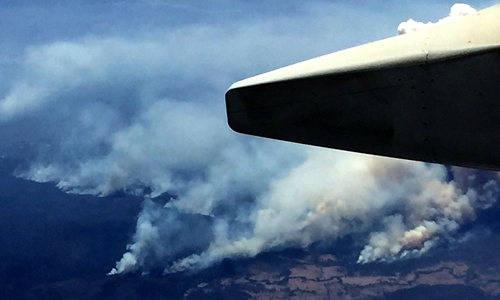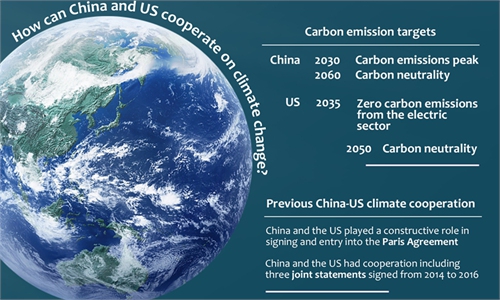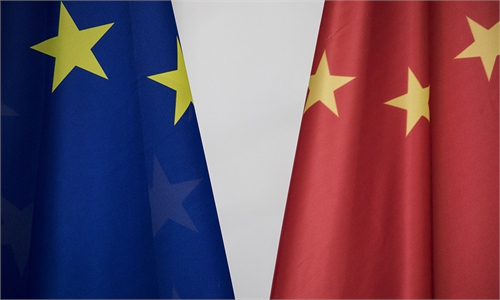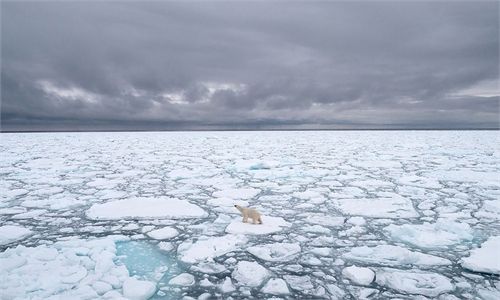To deal with climate change, China-US cooperation is important and sensitive: Global Times editorial

The aerial photo taken on Tuesday shows a bushfire rages in the Richmond Valley in New South Wales, Australia. Bushfire-prone Australia has seen a horrific start to its fire season, which scientists say is beginning earlier and becoming more extreme as a result of climate change. Photo: AFP
China and the US issued a joint statement on Sunday after the two countries' special envoys for climate change held talks from Thursday to Friday in Shanghai, which emphasized strengthening cooperation to tackle the climate crisis. Both countries are looking forward to the US-hosted Leaders Summit on Climate on April 22-23. They share the summit's goal of raising global climate ambitions on mitigation, adaptation, and support on the road to COP 26 (26th UN Climate Change Conference of the Parties) in Glasgow which begins on November 1.Kerry is the first senior official of the Biden administration to visit China. Judging from the statement, it is fair to say that China and the US have communicated quite effectively and achieved some results. However, global opinion has been cautious in assessing the outcome. With China yet to announce plans for its top leader to attend the summit on climate, more analysts are waiting for things to become clearer.
Again, the general environment among the big powers is not good, thus dampening people's optimism. At about the same time as Kerry's visit to China, Japanese Prime Minister Yoshihide Suga visited the US, and the joint statement of the US and Japan struck an unfriendly tone toward China. Also recently, the US expelled 10 Russian diplomats on Thursday, and Russia announced Friday it would expel 10 US diplomats in retaliation. The US wants to show leadership by working with China and Russia to address the climate challenge, while it is also obstructing China and Russia in other spheres. That is not what normal relations between great powers should be like.
The UN climate action involves the fundamental interests of humanity and the specific arrangement for reducing emissions concerning all countries' major development interests. Developed countries are particularly concerned about the issue. In addition to the urgent challenge of climate change, it is also because these countries have completed industrialization, therefore climate change is now one of their priorities.
However, developing countries are still in the process of industrialization and some have just started this process. People's living standards are still low in these countries, and it is particularly important to create more resources to improve people's livelihoods through further industrialization. Their right to subsistence is different from that of developed countries.
The previous US administration flatly withdrew from the Paris Agreement and the current administration has come back. US' interests have been behind both decisions. A tough stance is the biggest feature of US foreign policy in recent years. The US does not hesitate to push forward its domestic agendas through confrontation. From resisting the Paris Agreement to leading its implementation, will Washington use national strength as a lever to force other countries take more obligations while it is seeking more interests? Countries should be vigilant against this.
In an extreme scenario, if the world is about to promote carbon neutrality today, then the world's economic development pattern will be perpetuated as it is today. The development gap between developed and underdeveloped countries will become permanent. The US elite have disputes on many issues but they have the same fascination with US hegemony. The Trump administration's withdrawal from the Paris Agreement was intended to expand the room for the US' economic growth in a crude manner. By returning to the agreement, the current US administration is trying to play the role of a leader and thus squeeze developing countries' room for growth to achieve the same goals as the previous administration wanted to. It is worth observing whether this is the case.
In particular, though China and the US are both the largest emitters, the two countries have huge differences in population and economic development, but the US wants China to take more responsibilities in reducing emissions. It is also worth observing the relations between such pressure from the US and the US' geopolitical move to pressure China.
At any event, China has earnestly practiced the Paris Agreement and announced before the United Nations General Assembly last year that China would strive to achieve peak carbon dioxide emissions before 2030 and carbon neutrality by 2060. As a developing country with strong technology to reduce emissions, China has been at the forefront of promoting the implementation of the United Nations Framework Convention on Climate Change. China is also totally sincere on the desire to cooperate with the US.
Nonetheless, the deterioration of the international environment is self-evident, with the US' strategic plot to contain China being overt.
China needs to firmly advance the Paris Agreement and prevent the US from using its "leadership" to damage the balance of interests of China, as well as find a balance between its coordination with the US, France, Germany and the European Union and with developing countries. We should promote that the common interests of humanity are jointly defined by the interests of peoples from all countries, rather than by a handful of countries that want to monopolize this definition.



